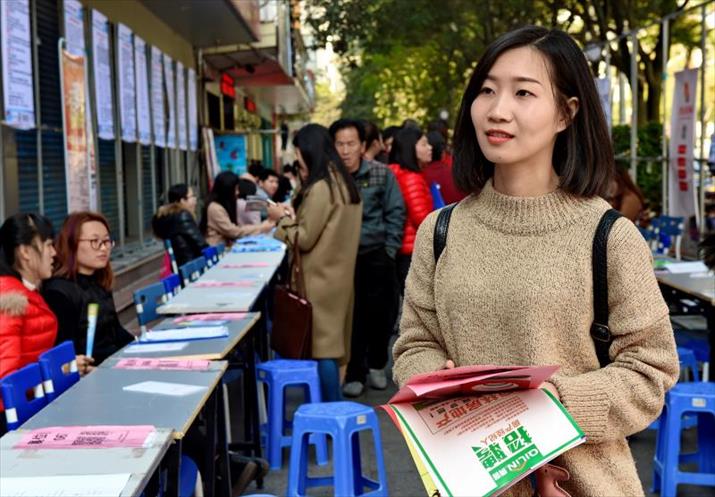|
||||||||||
| Home Nation World Business Opinion Lifestyle ChinAfrica Multimedia Columnists Documents Special Reports |
|
||||||||||
| Home Nation World Business Opinion Lifestyle ChinAfrica Multimedia Columnists Documents Special Reports |
| Current Cover Story |
| Evaluating Equality |
| China ahas made great strides in promoting gender equality but a change of mindsets is still required |
| By Ni Yanshuo | VOL. 9 March 2017 ·2017-02-24 |

Little did Han Han realize his new film Duckweed would thrust him into the maelstrom of a nationwide controversy, especially among young women, before it premiered on January 28, the Chinese Lunar New Year Day. The theme song, released before the premiere, lit up social media placing the famous writer, car racer and film director in decidedly hot water.
At the heart of the criticism was a complaint from Xu Xin, a 20-year-old actress who accused Han of discriminating against women in the song's lyrics.
"When innocent boys hear the song they will be influenced and will very probably discriminate against women in their life," said Xu.
Before marrying me, you must know this: Every day, you [the woman] must get up earlier than me, sleep later than me; you must cook good meals for me and keep good relations with my mother and my sister.
These are some of the lyrics Han wrote for the song.
"Nowadays, women do not need to place their hopes on men, or prove themselves based on the love from their husbands," said Xu.
For Xu, Han's message in the song is outdated. "Maybe decades ago, women might choose to keep silent when they came across such a song. But now, the idea of gender equality has been deeply rooted in people's minds and many women are standing up and expressing their own ideas," she said.
Without doubt gender equality has been widely recognized in China. According to a survey by Shanghai Municipal Statistics Bureau, 94.1 percent of the respondents believe that women and men are playing equal roles in social development. Some even believe that women are playing bigger roles than men.
The Internet-related figures also indicate women's rising social status. A total of 67 percent of the users of Weibo, a Chinese Twitter-like microblogging website, are women, according to Weibo statistics. Figures from Alibaba, China's e-commerce giant, show that women in China contributed to 70 percent of online sales in 2016.
"Though there are some cases that show gender inequality, it is true that women's social status has been greatly improved over the past decades," said Xu. "Women should learn to be independent."
Legal backing
Thanks to the increase of people's awareness of gender equality, women know how to protect their rights and interests when they come across discrimination and China has enacted laws and regulations to safeguard women's rights.
Based on the provisions of the Constitution that women enjoy equal rights with men in all spheres of life, in political, economic, cultural and social, and family life, China set the gender equality its basic state policy in 1995.
Since then, great progress has been made in this regard, said Song Xiuyan, Vice President of the All-China Women's Federation in a symposium on gender equality in Beijing in December last year.
Over the past 20 years, more than 20 laws and regulations related to the protection of women's rights and interests have been enacted and revised, including the Marriage Law, Employment Promotion Law, Law on the Protection of Rights and Interests of Women, and Special Regulations on the Labor Protection of Female Employees. In March 2016, the Anti-Domestic Violence Law became effective.
Putting the laws into practice has also made prominent progress. According to the Gender Equality and Women's Development in China, a white paper issued by the State Council in September 2015, the gender gap in education has been markedly narrowed in China.
Women now enjoy better opportunities in junior middle school education and above. Statistics from the white paper show that in 2014, female students accounted for 46.7 percent and 50 percent, respectively, of the total enrolments in junior and senior middle schools, and in the institutions of higher learning, they accounted for 52.1 percent of undergraduate students, 51.6 percent of postgraduate students, and 36.9 percent of those studying for doctoral degrees.
Having received better education, women are playing bigger roles in the management of state and public affairs. According to the white paper, women deputies to the First Session of the 12th National People's Congress in 2013 accounted for 23.4 percent, 2.4 percentage points higher than 20 years ago. In the same year, the female employees in central government agencies and their subsidiaries reached 47.8 percent.
| 2Next |
| About Us | Contact Us | Advertise with Us | Subscribe |
| Copyright Beijing Review All rights reserved 京ICP备08005356号-5 京公网安备110102005860号 |